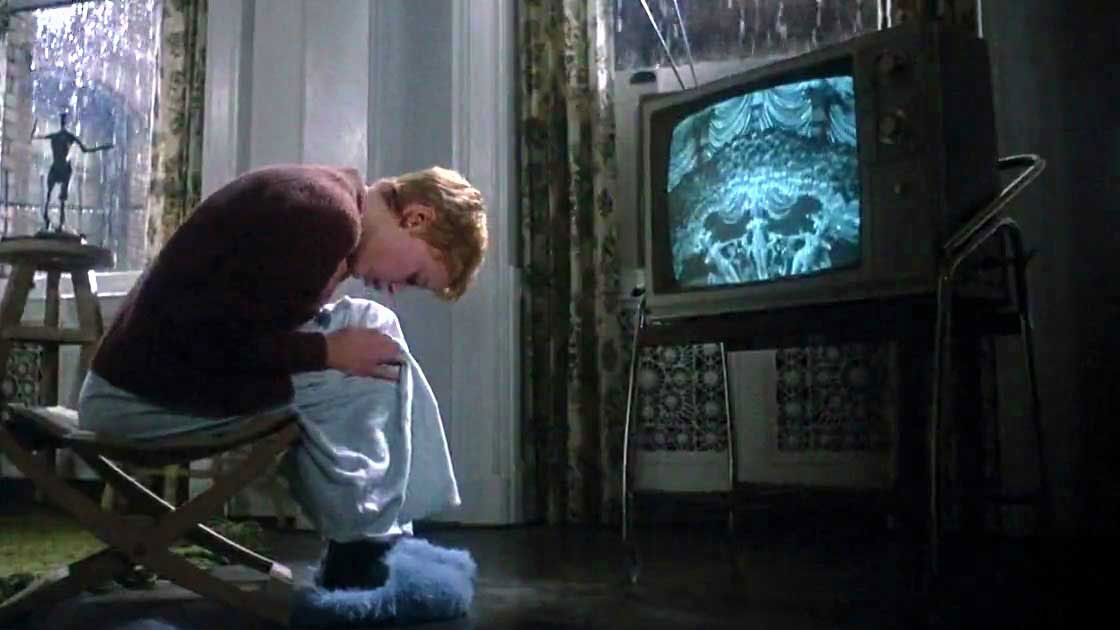Rosemary’s Baby (1968) expresses some of the anxieties about evil children explored in The Bad Seed (1956) and Village of The Damned (1960) (an adaptation of John Wyndham’s The Midwich Cuckoos). It also tapped into the ongoing debate about a woman’s right to choose – if only Rosemary could have marched into Planned Parenthood for some objective medical advice, instead of falling under the control of religious maniacs! This wildly influential movie paved the way for the evil children movies of the 1970s (from It’s Alive to Alien) and is referenced heavily by current horror filmmakers (see: Get Out and Hereditary).
Night of the Living Dead deals with what happened when your nearest and dearest turn against us. Rosemary’s Baby posits a different, equally chilling set of questions. What if your family were never particularly ‘near and dear’? What if, like the cuckoo, some entity left one of its hatchlings in your unsuspecting nest? What if some monster was growing among you, inside you; every outward inch an innocent child, every inner molecule an abomination? This struck a chord with the thousands of women who had taken Thalidomide to ward off morning sickness, who found themselves giving birth to armless, legless, twisted little torsos. It also resonated with the Greatest Generation, who had fought to build a better world then discovered they had spawned… anti-war hippies. It may also have given pause to the families of Vietnam conscripts, whose sons, brothers and husbands went away for a tour of duty and came back… different.
Producers Robert Evans and William Castle snapped up the rights to Ira Levin’s 1967 novel before it was published and the movie rode the wave of the bestseller buzz (it sold more copies than any other horror novel of the decade). After Alfred Hitchcock turned down the job, European wunderkind director Roman Polanski, riding high after Repulsion (1965) and Cul-de-Sac (1966), was hired to write and direct – Polanski would eventually snag an Academy Award nomination for the screenplay.
Rosemary (Mia Farrow) is perfectly cast as the ultimate 1960s naïf, fluffy haired, big-eyed, married to manly actor Guy (John Cassavetes) and desperate to Be Nice To Everyone. Poor, doomed Rosemary!
When she and Guy move into a new apartment, one slightly beyond their means, all sorts of strange things start happening. Only no one really sees fit to tell Rosemary what’s really going on. Guy becomes an overnight success, owing to another actor mysteriously being struck blind. Rosemary becomes pregnant, after a strange dream. The Castevets, their elderly neighbors, become all parental, start feeding Rosemary herbal drinks and introduce her to the ‘best’ obstetrician in New York, at mates’ rates.
Life should be rosy for the mother-to-be, but she starts reading all sorts of strange things into the events around her. As she sinks deeper and deeper into a state of paranoia, Polanski plays deftly with the audience’s
sensibilities – is Rosemary subject to a hormonal mania brought about by her pregnancy? Or is she really the victim of a satanic plot, the unknowing sacrifice in her husband’s ruthless quest for fame?
The steadily tracking camera on a permanently low angle that keeps missing vital faces and expressions (we sense Rosemary’s reactions by the movement of her feet, half the time) contributes to the audience’s share in Rosemary’s paranoia.
Farrow’s haunted and haunting performance (could those dark circles under her eyes get any bigger?) is central to the horror in this film. Some of it is method acting, some of it isn’t. She was plunged into a messy divorce from 29-years-her-senior Frank Sinatra during filming (he served her papers while she was on set). The shot of a nurse giving Rosemary a vitamin injection early on is real – as is the chopped liver she wolfs down in another scene (Farrow is a vegetarian).
The message of Rosemary’s Baby can be boiled down to “Trust No One”. They, the Other, are all around us, and They will win in the end. The power balance within the movie suggests it’s hopeless even to resist. Rosemary is not the skilled opponent to Satan that, for instance, the Duc de (Christopher Lee) is in Hammer’s The Devil Rides Out; instead she represents a lost generation of sinners, no authority or ritual or morals to protect them, stumbling into the arms of a coven because there’s nowhere else to go.
Although she doesn’t deliberately choose to turn to the dark side, Rosemary’s moral failings make her vulnerable. While Rosemary is presented as The Innocent, in childish short dresses, flat shoes, little make-up THAT $5000 Vidal Sassoon haircut, she’s not entirely stainless. She has greedy and ambitious tendencies, doggedly giving the impression that Guy is a more successful actor than he is to everyone they meet in the first half hour of the movie. She is lustful too, her “Let’s make love” on the bare floor of the apartment leads to clammy sex on the floorboards (at least Guy takes his socks off). Ultimately, it seems that Rosemary is punished for her poor choices (she goes along with marital rape, she drinks Minnie’s foul smoothie without checking the ingredients), although she is very much a character of her times in her fearful passivity.
Further Reading
- This Is No Dream: Making Rosemary’s Baby (Reel Art Press 2018) by James Munn and Bob Willoughby
- The Most Cursed Hit Movie Ever Made by Rosemary Counter, in Vanity Fair June 1, 2017
- Filmsite.org
- spiritual view from Hollywood Jesus
